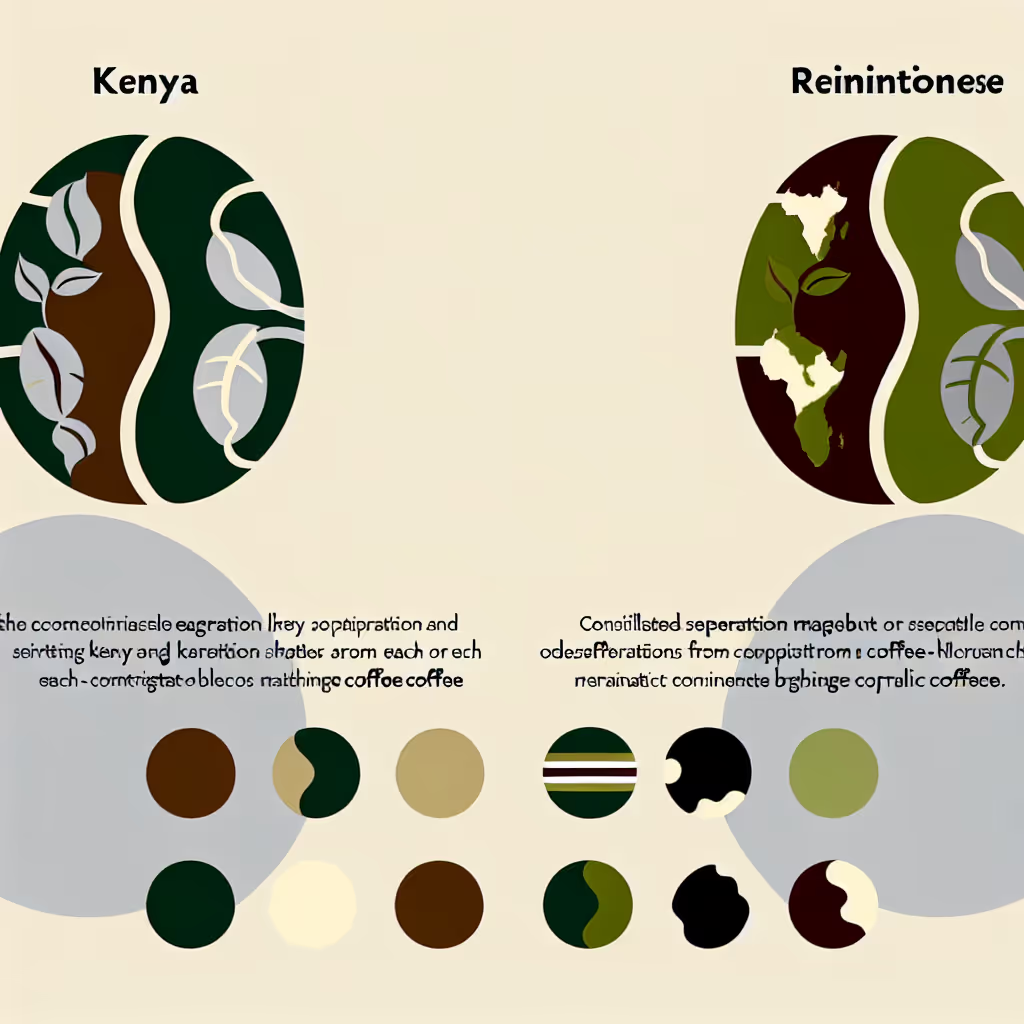Kenyan Vs. Togolese Coffee
This comparison explores the unique qualities of Kenyan and Togolese coffee, highlighting their distinct flavor profiles, growing conditions, and cultural significance in the world of specialty coffee.

Brief Description
Kenyan coffee is renowned for its bright acidity, full body, and complex flavor profile. Grown in the rich volcanic soils of the Central Highlands, these beans benefit from ideal climate conditions and meticulous processing. The result is a cup that's bold, wine-like, and often described as the 'connoisseur's choice'. With notes ranging from blackcurrant to citrus, Kenyan coffee offers a truly unique and memorable tasting experience.
Togolese coffee, primarily Robusta, is grown in the lush Plateau Region of Togo. Known for its bold flavor and high caffeine content, Togolese coffee has been gaining recognition in recent years. The country's tropical climate and rich volcanic soils contribute to the unique characteristics of its coffee. Despite being a smaller producer, Togo is making strides in improving quality and sustainability practices, aiming to carve out its niche in the specialty coffee market.
Importance of Comparison
Comparing Kenyan and Togolese coffee is crucial for coffee enthusiasts seeking to explore diverse African origins. Understanding the differences between these two distinct coffee-producing regions helps buyers make informed decisions based on flavor preferences, brewing methods, and sustainability practices. This comparison also sheds light on the evolving coffee industry in Africa and the unique contributions of each country to the global coffee market.
Key Attributes
Origin
Kenyan
Togolese


Consumer Guide
When choosing between Kenyan and Togolese coffee, consider your flavor preferences and brewing methods. Kenyan coffee, known for its bright acidity and complex flavors, is ideal for pour-over and French press brewing. It's perfect for those who enjoy a bold, wine-like cup with notes of blackcurrant and citrus. Togolese coffee, primarily Robusta, offers a strong, earthy flavor with higher caffeine content, making it suitable for espresso and cold brew. If you prefer a more intense, full-bodied coffee, Togolese might be your choice. Consider the altitude difference: Kenyan coffee grows at higher elevations (1400-2100m), contributing to its complexity, while Togolese coffee (500-1000m) results in a more straightforward flavor profile. Lastly, think about sustainability and supporting smaller producers – choosing Togolese coffee can contribute to the country's growing specialty coffee industry.
Expert Opinions
Coffee expert Maria Rodriguez notes, 'Kenyan coffee is often considered the pinnacle of African coffee, with its vibrant acidity and complex flavor profile. Togolese coffee, while less known, is making strides in quality and offers a unique representation of West African coffee.' Roaster John Smith adds, 'The double fermentation process used in Kenya contributes to its distinctive taste, while Togo's natural processing methods result in a more rustic, full-bodied cup. Both origins offer exciting options for different palates and brewing preferences.'
FAQs
Kenyan coffee is known for its bright acidity, complex flavor profile with notes of blackcurrant, citrus, and floral undertones. Togolese coffee, primarily Robusta, offers a bolder, earthier flavor with nutty and chocolatey notes. Kenyan coffee is often described as wine-like, while Togolese coffee is more full-bodied and intense.
Kenyan coffee is grown in the Central Highlands at altitudes of 1400-2100m, benefiting from rich volcanic soils and ideal climate conditions. Togolese coffee is cultivated in the Plateau Region at lower altitudes of 500-1000m, with a tropical climate and volcanic soils. The higher altitude of Kenyan coffee contributes to its complexity, while Togolese coffee's lower altitude results in a more straightforward flavor profile.
For Kenyan coffee, pour-over, French press, and cold brew methods are recommended to highlight its complex flavors and bright acidity. Togolese coffee, with its bold flavor and high caffeine content, is well-suited for French press, espresso, and cold brew preparations. The choice of brewing method can significantly impact the taste experience of each origin.
Kenyan coffee typically undergoes washed processing, double fermentation, and sun-drying, contributing to its clean, bright flavor profile. Togolese coffee is processed using natural, washed, and semi-washed methods, resulting in a more varied range of flavors. The double fermentation process in Kenya is particularly noteworthy for developing the coffee's complex taste.
Kenya produces significantly more coffee annually, with an output of around 50,000 metric tons. Togo, being a smaller producer, has an annual production of approximately 15,000 metric tons. This difference in production scale reflects Kenya's more established position in the global coffee market compared to Togo's emerging status.
Both Kenya and Togo are working on improving sustainability in coffee production. Kenya has a more established sustainability framework, with many farms implementing eco-friendly practices. Togo is making strides in improving quality and sustainability, particularly as it aims to carve out its niche in the specialty coffee market. Supporting Togolese coffee can contribute to the development of sustainable practices in this emerging origin.
Conclusion
Kenyan and Togolese coffees offer distinct experiences for coffee enthusiasts. Kenyan coffee stands out with its bright acidity, complex flavors, and established reputation in the specialty coffee world. It's ideal for those seeking a nuanced, wine-like cup. Togolese coffee, while less known, provides a bold, full-bodied alternative with its Robusta beans and unique processing methods. It's perfect for those who prefer a stronger, more intense coffee experience. Both origins reflect the rich diversity of African coffee and offer exciting options for different palates and brewing preferences. Whether you choose the renowned complexity of Kenyan beans or the emerging boldness of Togolese coffee, you're sure to embark on a flavorful journey through Africa's coffee landscape.






